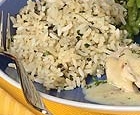|
Greek Side Rice Pilaf A classic Greek dish—the rice is sauteed before adding broth and then cooked in the oven rather than on the stove. 3–4 T oil Preheat oven to 375. Bring stock to a boil in a saucepan. In the meantime, heat oil in a large skillet over medium heat. Add onion and saute 5-7 minutes, till translucent. Add rice, cooking and stirring for 10 more minutes until rice becomes translucent. Add salt & pepper and toasted nuts. Transfer rice to a lidded casserole.* Add boiling stock and cover quickly and tightly with foil. Bake for 35-40 minutes, till rice grains are fluffy and liquid has evaporated. Sprinkle with chopped parsley and serve immediately. Serve with Pork Kebobs or Roast Leg of Lamb. * If your sauté skillet is oven proof, with a lid, use that. Then you won’t have to transfer the rice to a casserole and lose heat. |
Tips & Glossary You may not have a number of ingredients used in Greek cooking in your spice shelf, but you can find them at Mid-Eastern food stores. So to avoid frustration, make a list of the items you need before trying out the recipes. Filo: aka phyllo, paper-thin sheets of raw, unleavened flour dough. Purchase frozen in most grocery stores and follow directions on package for thawing. When working with a sheet, keep others covered with a damp towel to prevent drying out. Grape Leaves: Grape leaves are sold canned in salted oil. Rinse off the salt before using. If you want, prepare your own: find fresh, tender young leaves and plunge them for 1 minute into boiling water (with 1 or 2 T lemon juice). Then proceed with recipe. After blanching, you can freeze them for later use. Here’s how: blanch as above, dunk in iced water, pat dry with towels, and seal in an air-tight plastic bag. They're safe for 6 months, but use quickly when thawed. Nutmeg: Use small whole nuts and store them, tightly covered, in a dry dark area. Grate what you need using the smallest grating edge or grind in a food processor. What a difference from store bought nutmeg! Pine Nuts: edible seeds of pine trees used in many Greek dishes. Before cooking, release flavor by lightly browning in a heated skillet Skewers: Use metal or wooden skewers for kebobs. If wooden, soak 30 minutes before using to prevent them from catching on fire. Rosewater: distilled from rose petals and used to flavor Mid-Eastern and Asian cooking. You can make your own. But, seriously, why would you? Purchase it at Asian or Mid-Eastern stores. Semolina: aka farina or Cream of Wheat; a coarsely ground wheat grain. You also know it as couscous. If made from durum wheat, it is used to make pasta. Tarama: poor-man's caviar. From carp roe, it is pinkish-orange and is what (along with food dye) gives taramasalata its lovely color. Buy it jarred in Mid-Eastern food stores.
|

